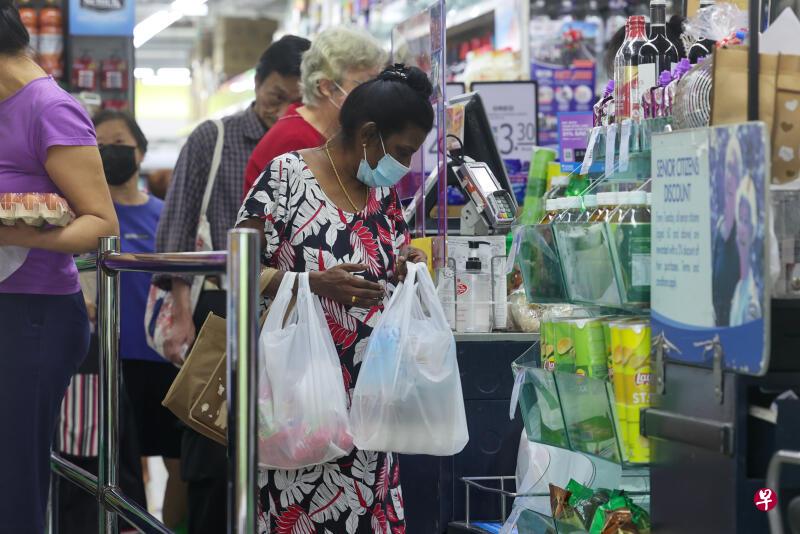
The Singapore Statistics Bureau is conducting a family expense survey every five years. In the last time of the last time in 2017/18It is used for meals outside, and about 54%of the meals are consumed in the venues such as hawkers, food, coffee shops and other places.Therefore, the cost of dining in foreign countries affects the nerves of Chinese people.
Last Monday (March 13), the Singapore School of Public Policy (IPS), the National University of Public Policy, the National University of Singapore, was published in the food.The average price of 13 kinds of price rose significantly.
Among them, the average selling price of Bing Meilu was 1.72 yuan at the end of last year, an increase of 1.84 yuan at the beginning of this year, an increase of 1 point, 2 points or 7%.drinks.Followed by baked bread breakfast (roasted coconut bread, two half -life cooked eggs and a cup of coffee), the average selling price increased from 3.07 yuan to 3.28 yuan, an increase of 6.8%.The average price of economic vegetable vendors and fish ball noodles is lower than 4 yuan.
TheIPS survey was conducted from September to November last year and January to February this year.Investigators visited 92 hawker centers, 636 coffee shops and 101 air -conditioning pavilions in 26 residential areas across the country, and recorded the prices of 18 kinds of daily foods and beverages.
Investigators visited the price and comparative prices twice to observe whether the price of foreign meals rose significantly after a percentage of a percentage of a percentage of consumption taxes higher than one percentage points.According to the survey report, many vendors did not adjust the price during this period, and the average price increase was not more than 3 a horns, and most of the food increased at more than 1 corner.
IPS's survey time is only five months, and it may not be able to fully reflect the rise of food prices.In addition, the investigator's information is mainly taken from the price list displayed by the vendors, and some price tables may not be updated immediately.On the other hand, the price of unchanged prices but the disguise of food has increased price, which is not within the scope of the investigation.
Even so, the IPS survey found that the price of a variety of catering increased significantly, which coincided with the rise in food prices, and also echoed the government's inflation data released by the government every month.
The data jointly released by the Singapore Financial Administration and the Ministry of Trade and Industry showed that the overall inflation rate in Singapore reached 6.1%last year, which is much higher than 2.3%in 2021.In January of this year, the overall inflation ratio reached 6.6%, of which food prices rose 8.1%.They warn that global commodity prices may face a new round of impact, and the inflation factors in the periphery and endogenous may continue to be longer than expected, making inflation facing the risk of upward.
In terms of peripheral factors, the Russian war has pushed up food and energy prices, and the tension between Sino -US relations has affected the global supply chain.Although the inflation of major economies shows signs of views, they are still at a high level.Under the atmosphere of geopolitical continuous tension, food and energy prices are likely to continue to rise.
In terms of internal factors, the tightening of the human market has led to continuously rising costs, including the progressive salary model for some industries, although the concept of tolerant society is reflected, it also increases the risk of wages and prices in spirals.On the other hand, consumption taxes are prudent and necessary public fiscal policies, but it also played a role in inflation.
The government has spared no effort to alleviate the pressure of inflation to Chinese people, especially low -income groups.This includes providing Linlin's total subsidy such as consumption tax subsidy coupons, neighborhood shopping vouchers, water and electricity costs and miscellaneous fees.In addition, the government has added a new hawker center to allow more people to have more cheap choices during food food.
On the other hand, the Housing and Development Bureau stipulates that starting from May this year, when all coffee shop operators update the lease, at least four economic meals and two economic drink options must be provided.At present, there are 72 coffee shops in the construction bureau that meet this condition. The average price of their economic meals is from 3 yuan to 3.50 yuan, and drinks are 1 yuan to 1.15 yuan.By 2026, all 374 rental coffee shops will sell economic meals.
However, the increase in operating costs such as ingredients, rent and employee salary will eventually be reflected in price.The rise in prices increased the pressure of rising wages, and the rise in wages increased its operating costs, further pushing up prices.When people think that the rise in nominal wages cannot completely offset the pressure of 100 things, anxiety or even dissatisfied emotions will emerge.
The government's fiscal transfer helps the Chinese people to relieve the pressure of living expenses, but it is difficult to recover after the rise in prices and push up inflation expectations.The price of the price of items not only affects people's livelihood, but also weaken Singapore's international competitiveness.Singapore is certainly an export -oriented small economy that cannot control the input -type inflation.However, by adjusting the endogenous inflation factors, including operating costs such as rent and legal charges, it may more effectively reduce the inflation expectations and pressure of Chinese people.


